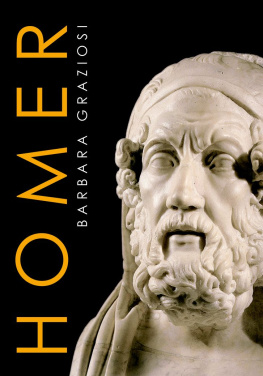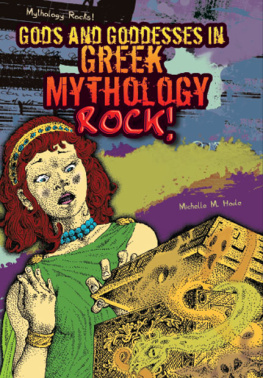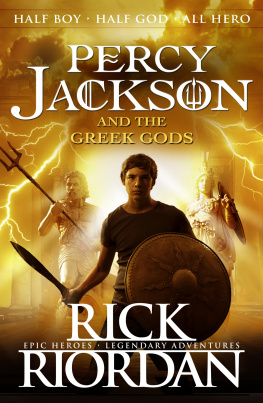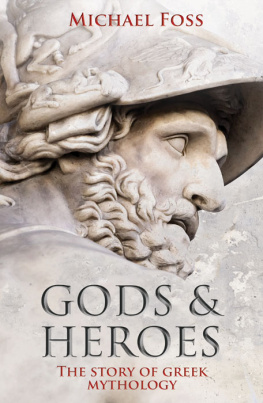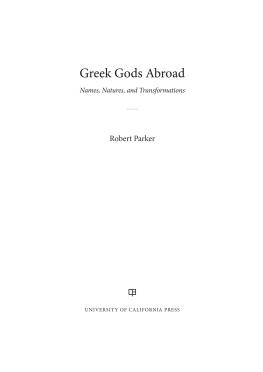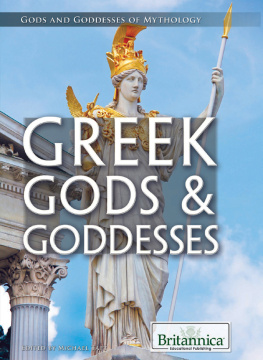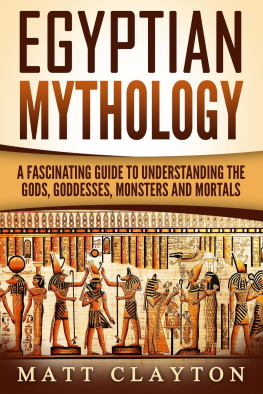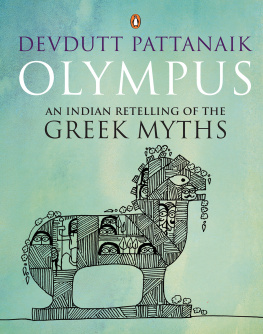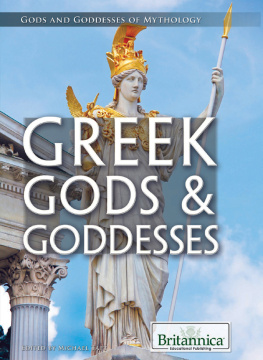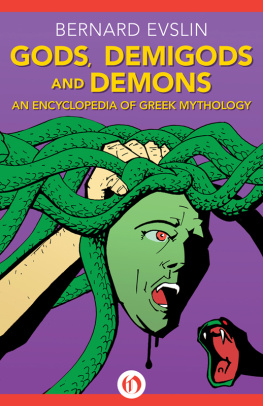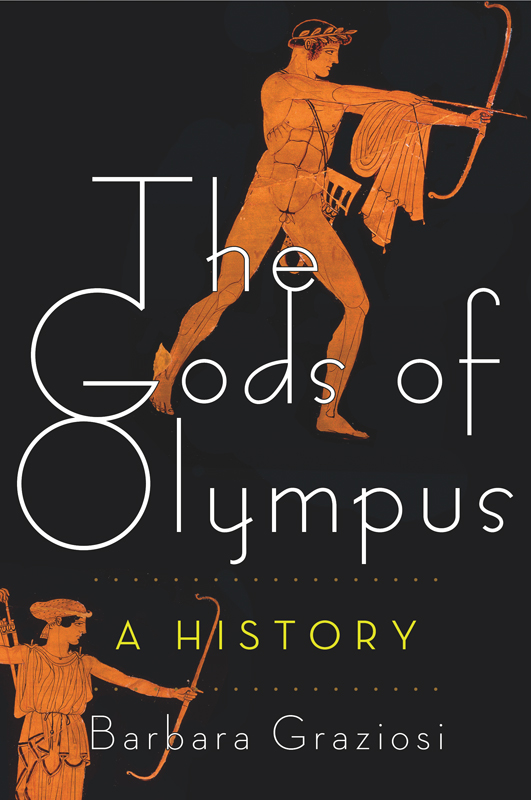
The author and publisher have provided this e-book to you for your personal use only. You may not make this e-book publicly available in any way. Copyright infringement is against the law. If you believe the copy of this e-book you are reading infringes on the authors copyright, please notify the publisher at: us.macmillanusa.com/piracy.
To Johannes
CONTENTS
PREFACE
Simonides Was Wise
This book is a history of the Olympian godsthe most uncivilized ambassadors of classical civilization. Even in antiquity the gods were said to be cruel, oversexed, mad, or just plain silly. Yet they proved to be tough survivors: our earliest texts and images often depict them as travelers, and they managed to keep on the move for thousands of years. When the Greeks conquered Egypt, they started to resemble pharaohs; when the Romans conquered Greece, they merged with the local divinities of Rome; under Christianity and Islam, they lived on as demons, metaphors, allegories, and astrological principles; and in the Renaissance, they announced a new belief in humanity. Like many migrants, they adapted to new circumstances, while retaining a sense of their distant origins. This book traces the travels and transformations of the Olympian gods over more than two millennia, and over thousands of miles. It spans from antiquity to the Renaissance, because it is in this period that the Olympian gods made their most extraordinary journeya journey that changed them from objects of religious cult to symbols of human creativity.
Some histories of classical civilization emphasize the similarities between antiquity and modernity; others insist on the differences. This book attempts a different approach: rather than offer comparisons, it focuses on the processes of transformation. It tells a motley and miscellaneous tale, with many different characters, places, and encounters. The Olympian gods ranged widely; to follow in their tracks, one has to combine the insights of several academic disciplines, but it also helps to remain alive to the undisciplined vitality of the gods themselves. They were versatile and tenacious, managing to capture the worlds imagination even after the death of their last worshippers.
When I look dispassionately at this project of writing about the gods, I realize that it must fail on at least two counts. Contemporary readers, even readers with a strong interest in classical civilization, do not seem to invest much in the Olympian deities. Conversely, people of earlier times invested so much thought and energy in them that it is impossible to do justice to their insights, visions, and experiences. Faced with the prospect of failing both my ancient interlocutors and my modern ones, I would instinctively like to carry on researching the gods of Olympus indefinitely, without actually writing a word about them.
There are, as it happens, good precedents for doing just that. The Roman orator Cicero, in his study On the Nature of the Gods, mentions the earlier Greek poet Simonides as his role model when dealing with the gods. This Simonides once found himself in a difficult situation: the tyrant of Syracuse asked him what a god was. Simonides pleaded to be granted a day to think about it. After one day, he asked for two, and then for four. When the amazed tyrant asked the poet what in the world he was doing, Simonides answered: The more time I spend thinking about the issue, the more obscure it seems to me. Simonides was wise, and I sympathize with his position. But I also sympathize with the idea that the gods thrive on conversationthat their characters, looks, and meanings are defined, and redefined, by people who talk about them and try to make sense of what others say. As Simonides implies, this is a conversation that lasts longer than a lifetime. It has already carried on for millennia and involved people from many different places. All I can do is join it, offer my perspective, and perhaps make one suggestion: that thinking about humanity must include at least some consideration of the Olympian gods.
INTRODUCTION
A Family Portrait
The world of the ancient Greeks was full of deities: nymphs inhabited valleys and streams, Nereids lived in the depths of the sea, and satyrs roamed the woods. There were Titans, imprisoned deep in the bowels of the earth, and winged harpies, and sirens. This unruly multitude of gods was hard to manage, or even count, but the Greeks trusted that they all answered to Zeus, the supreme god, and to his immediate relatives who lived with him on Olympus. The twelve Olympian gods were the most important deities of ancient Greece, and they could travel everywhere. Nymphs, Nereids, and satyrs remained confined within their native landscapes, but the gods of Olympus claimed the entire world as their own and demanded worship wherever they went: Homer, for example, described their travels all the way to Africa and northern Europe. It is partly because they were always conceived as universal powers that the gods of Olympus proved to be interesting to so many different people.
In ancient Greece, the personality of each god emerged from several sources. There were the local cults, with their specific rituals and unique atmospheres; the divine names of the gods, which had many possible explanations; the stories and poems that people shared; and the paintings and sculptures that represented the gods, particularly the cult statues housed in the temples. These elements combined and recombined in many ways across the Greek world. Similar cults attached to different gods; poems and myths traveled more swiftly than the adoption of new ritual practices; and images transcended even language barriers. All this makes it impossible to offer definitive and universal descriptions of the twelve gods of Olympus. It is always necessary to look in detail at the specific texts, objects, and places where the gods appeared and keep in mind that the relationships between them were constantly shifting.
As a group of twelve, the gods of Olympus came together primarily in poetry and art. Zeus was the most powerful of the twelvebut he was not all-powerful, because he needed and craved the company of his own family. For that reason, like all patriarchs, he had to settle for an uneasy compromise between power and comfort. Seated on Mount Olympus, he ruled over the entire world, but on the sacred mountain itself his family constantly undermined his authority. His wife, Hera, resented his affairs, challenged him, and sometimes even managed to trick him into doing what she wanted; his brother Poseidon demanded respect; his daughter Artemis charmed him in order to secure presents and promises; his son Apollo impressed and inhibited him; and little Hermes made him laugh, no matter how disobedient he was. Occasionally, Zeus threatened and thundered to remind his family that he alone was the ruler of the universe, but such outbursts were short and futile, for Zeus himself preferred the negotiations of family life to the loneliness of absolute power. After their mighty quarrels, the gods would make up over a big meal of nectar and ambrosia, tease one another, sing and laugh togetheruntil Zeus and Hera, finally reconciled, would withdraw to their bedroom.
One quick way to meet this lively family today is to visit them in London, where they still enjoy constant and devoted attention. Every day, hundreds of people walk down Great Russell Street, climb the steps of the British Museum, turn left past the souvenir shop, and walk straight to the main exhibit, in Room 18: the Elgin Marbles. There, visitors are confronted with the twelve gods of Olympus, seated on their thrones. The Parthenon frieze, whose design was overseen by Phidias in the fifth century BC, represents the gods surrounded by a grand procession of cavalry, chariots, elder citizens, musicians, women, magistrates, cattle, and sheep. This is a communal act of worship, which culminates in the ritual offering of a robe to the goddess Athena. Today, these ancient worshippers are surrounded in turn by crowds of modern admirers, who also reverently file in front of the gods. The most alarming thing about the scene on the frieze is that the gods seem entirely uninterested in the human beings who are paying homage to them. We see them in profile, seated on their thrones and talking to one another, while in the midst of their gatheringor rather in front of it, according to the conventions of Phidiass artthe worshippers carry out their ceremony. The frieze tells a rather disheartening story about the relationship between gods and mortals, because Athena fails even to notice the offering and simply continues chatting to Hephaistos on her right. Yet precisely because the gods are so unconcerned with what happens on the human plane, we are given the thrilling opportunity to observe them at our leisure and discover how they interact with one another on Olympus.


